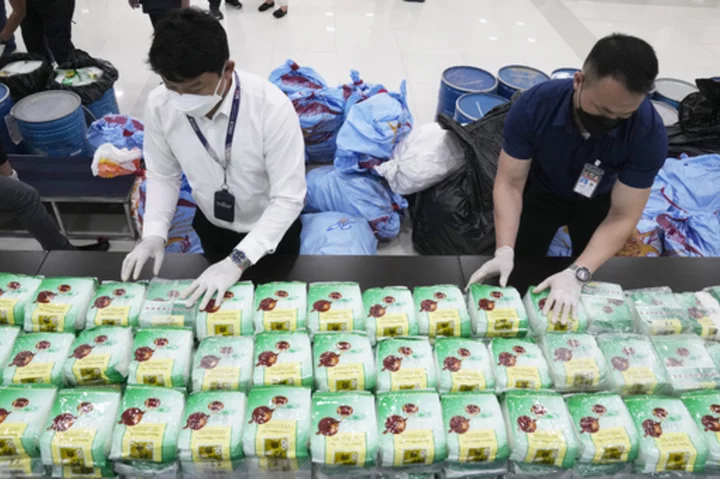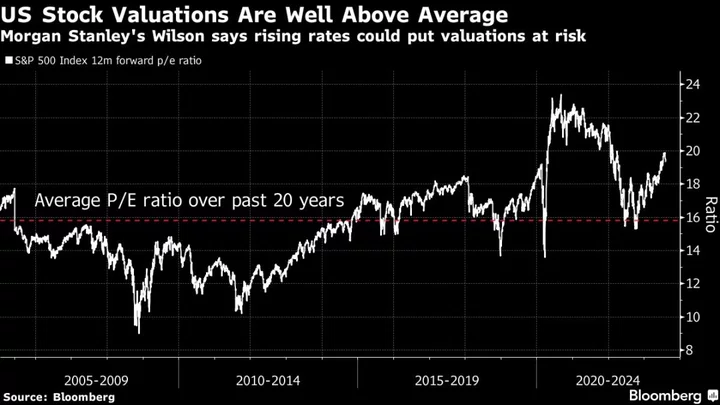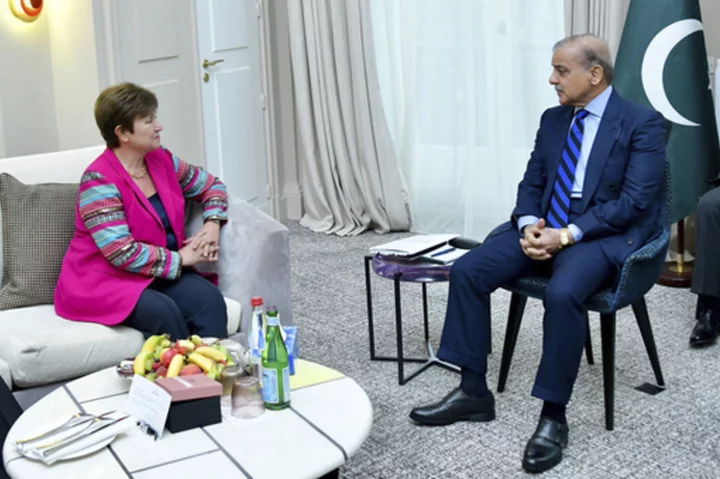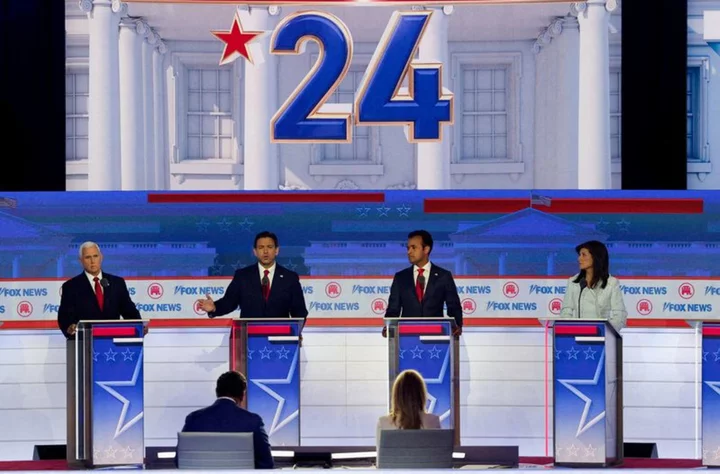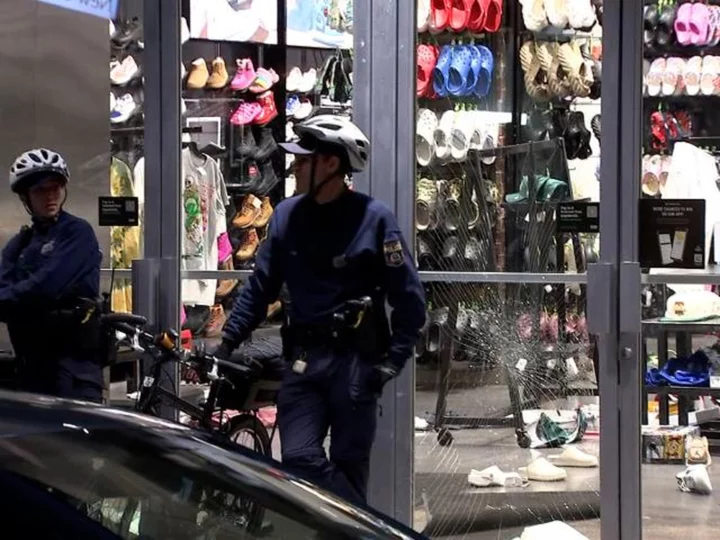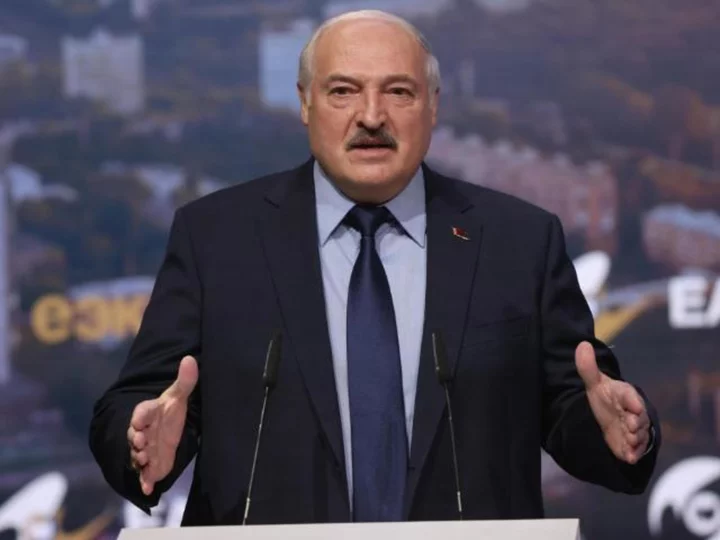BANGKOK (AP) — The huge trade in methamphetamine and other illegal drugs originating from a small corner of Southeast Asia shows no signs of slowing down, the United Nations Office on Drugs and Crime warned Friday.
“High volumes of methamphetamine continue to be produced and trafficked in and from the region while the production of ketamine and other synthetic drugs has expanded,” said the agency’s 2023 report, Synthetic Drugs in East and Southeast Asia.
The lion’s share of methamphetamine, in the form of tablets and crystal meth, comes from the area known as the Golden Triangle, where the borders of Myanmar, Laos and Thailand meet. The production of opium and heroin used to flourish there, mainly because of the lawlessness around Myanmar’s remote eastern Shan State. The area, much of it jungle, remains the domain of various ethnic minority militias, some of them partners in the drug trade.
“Methamphetamine continues to be the most used drug in East and Southeast Asia and that use has increased over the past decade,” the report says.
It's also easier to make on an industrial scale than the labor-intensive cultivation of opium, from which heroin is derived. The drug is then distributed by land, sea and air all around Asia and the Pacific.
The report says the control that major organized crime groups have over territory “has allowed them to massively increase and diversify supply for the purposes of market expansion and domination.”
“The most powerful regional trafficking networks are able to operate with a high degree of certainty they can and will not be stopped, and they are able to dictate the terms and conditions of the market as a result," it said.
There have been record methamphetamine seizures almost every year for the past decade in East and Southeast Asia, but the latest data suggest that the total drugs seized declined in 2022 to 151 tons, according to the report.
While a falloff in seizures often is seen as correlating with weakened production, the report says “other indicators — arrests, street availability, purity, record low wholesale and street prices, and treatment admissions — indicate the supply has remained very high or unchanged.”
It suggests the decrease in seizures was due to traffickers changing their smuggling routes.
“Traffickers working along Thai borders in the Golden Triangle rerouted significant crystal methamphetamine supply through central Myanmar over the later part of 2022 to avoid Chinese and Thai interdiction efforts,” it says, explaining that they increased shipments by sea from Myanmar’s coastal regions.
“Transnational organized crime groups anticipate, adapt and try to circumvent what governments do, and in 2022 we saw them work around Thai borders in the Golden Triangle more than in the past,” said Jeremy Douglas, UNODC regional representative for Southeast Asia and the Pacific. “Traffickers have continued to ship large volumes through Laos and northern Thailand, but at the same time they have pushed significant supply through central Myanmar to the Andaman Sea, where it seems few were looking.”
The UNODC also expressed concern that Cambodia has become "a key transit and to some extent production point for the regional drug trade.”
It suggests that even though there has been consolidation of synthetic drug production in the Golden Triangle, that development may reflect “some diversification of production and ‘hedging’ by organized crime.”
Industrial-scale ketamine labs and facilities for processing and storing the substance were found across Cambodia, raising serious concern throughout the region, it said.
“Organized crime groups have adopted a supply-driven market expansion modality similar to the approach taken to expand the methamphetamine market in the region that started in 2015,” warns the report about the trade in ketamine, which has legal use as an anesthetic.
Landlocked Laos, adjacent to both Shan State and northern Thailand, is another weak link in the fight against the drug trade, and “intelligence officials have come to the conclusion that supply is transiting the country with little resistance,” says the report.
The report says that in addition to becoming an increasingly important route for drugs trafficked out of Myanmar, meth tablet production was also detected there in recent years.
It says that meth and other drugs produced in Shan State laboratories usually enter Laos by crossing the Mekong river from ports “under the control or influence of major non-state armed groups.”
It names some of these: ethnic militias including the United Wa State Army, the Myanmar National Democratic Alliance Army, the National Democratic Alliance Army, “and their allies who work in partnership with transnational organized crime syndicates.”
The case of Laos also illustrates the difficulties of blocking the ingredients needed to produce the drugs from reaching the illegal labs.
Laos, it says, is becoming an increasingly important route for chemicals reportedly used in drug production in Myanmar, entering the country through Vietnam, Thailand, and China.
“Efforts to disrupt chemical flows into Myanmar’s drug-producing areas also continue to be impeded by slow and bureaucratic inter-agency coordination, inadequate resources and personnel, and limited cross border cooperation," the report says.
The traffickers also have taken initiatives in obtaining their needed supplies.
The main chemicals needed to make methamphetamines are generally under tight international controls, so illicit laboratories in recent years have moved to using chemicals that are not so closely regulated. The report says that the logistics of obtaining such chemicals have also been expedited by online ordering, especially from suppliers willing to disguise the nature of the transactions.

